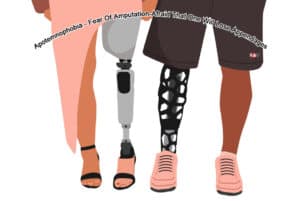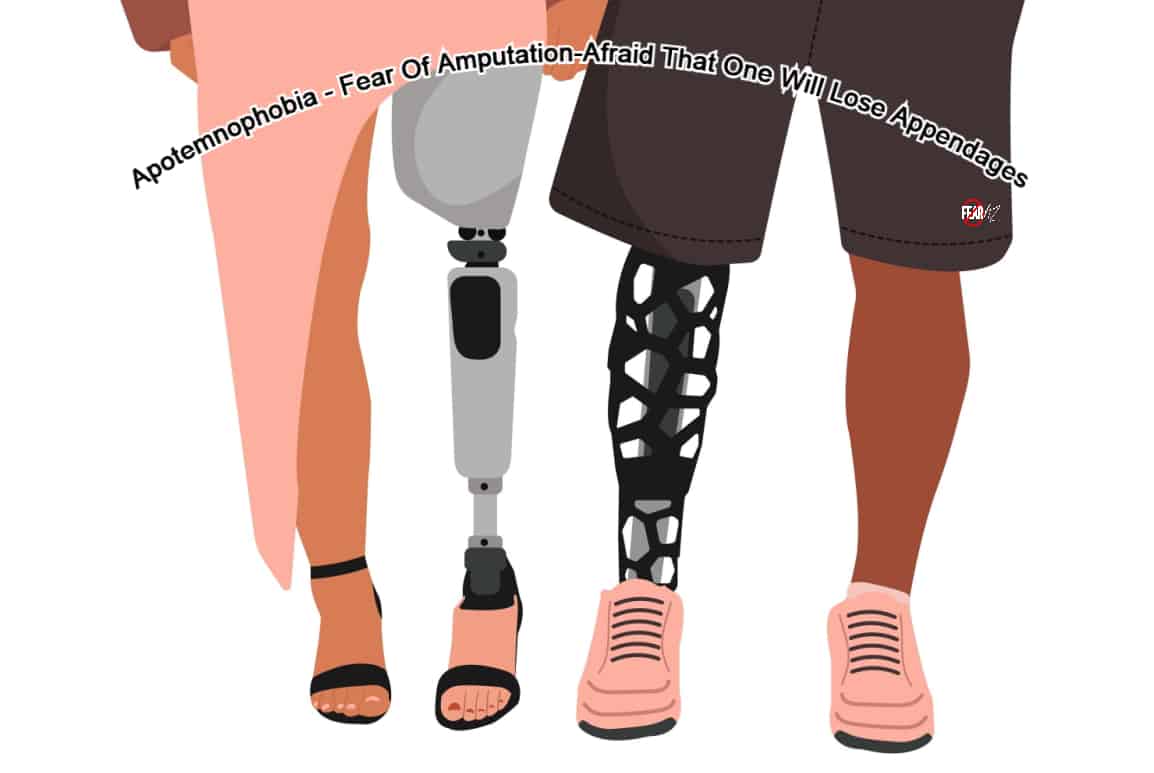Share This Article
Apotemnophobia or Fear of Amputation/Afraid One Will Lose Appendages
Does the thought or mention of amputation make you anxious? Do you constantly worry about amputation, even when there is no risk of it?
Or are you afraid of amputees themselves? Do you find yourself turning away at the sight of a prosthetic or avoiding those with amputations? Is it a source of distress and discomfort to you, disrupting your everyday life?
You may have apotemnophobia, a phobia of amputees and amputation.
If you belong to this group, you’re not alone. Many suffer from different kinds of phobias, and with proper knowledge and care, you can learn to manage your fear and lead a more normal life.

What Is Apotemnophobia?
Apotemnophobia is the fear of losing a limb or seeing someone who has limb loss. It comes from the Greek words apo meaning away, temnos meaning cut off or remove, and phobos meaning fear.
While many experience a passing fear of losing a limb, a person suffering from apotemnophobia experiences high levels of stress and anxiety at the sight of an amputee. They may go to great lengths to avoid seeing one.
Those with apotemnophobia may avoid hospitals or recovery and trauma centers even if they are in dire need of medical care. The anxiety is so high they are willing to neglect their care rather than risk encountering an amputee.
Some may try to escape from an environment where they spot an amputee or may suffer panic attacks. Others continually worry about encountering an amputee, and refuse to associate with one, even if that person is a relative or family friend.
Individuals with this phobia may avoid going out altogether for fear of encountering an amputee. This fear limits work and social life and may lead to depression or isolation.
Apotemnophobia Causes
The exact cause of apotemnophobia is unknown. However, like most phobias, it’s often a combination of several factors resulting in a deep fear of amputations and amputees.
Some of the factors are:
Genetic Predisposition
Genes play a role in the development of mental health issues, including phobias. Having a family history of anxiety disorders brings an increased risk of a person developing apotemnophobia. For those in this category, a traumatic event may trigger the development of the phobia.
Experience
One may develop this fear if they had been in an accident resulting in a limb being at risk of amputation. It could also develop if a person was born with a limb deformity, and their limb had to be removed.
Many studies indicate several psychological effects of amputation, which explains how people with a traumatic past with amputation develop apotemnophobia.
Witnessing an amputee and their daily life struggles can also lead to the development of the phobia.
Media
Parents often use stories to educate their kids about the importance of safe play. These stories often involve a child who did not follow the rules and had serious life-threatening injuries or even died. Such stories can leave a permanent mark on a child that can later develop into a phobia.
Amputation is a common topic often depicted in the news and in social media. Sometimes, for people suffering from anxiety, this small trigger alone can lead to the development of the phobia.
Apotemnophobia Symptoms
Symptoms of apotemnophobia vary from one patient to the next and depend on the severity of the phobia. While some may experience only a few mild symptoms, the symptoms of others may be severe.
Physical Symptoms
- Sweating
- Trembling
- High blood pressure
- Palpitations
- Perspiration
- Headaches
- Irregular heartbeat
- Hot and cold flashes
- Dry mouth
- Muscle tension
Psychological Symptoms
- Anxiety at the thought of amputation
- Fear of being amputated
- Fear of dying
- Panic attacks
- Confusion
- Obsession with avoiding amputation
Apotemnophobia Treatment
There is no definite treatment for apotemnophobia. However, a mental health professional can choose an appropriate treatment plan that is tailored to your needs by evaulating your condition. But before seeking professional help, consider trying some of these self-help methods first.
Self-Help
Self-help is regarded as the first line of treatment, because it allows a person to tackle their phobia in its early stages. Here’s a list of things you can do to help yourself:
- Keep a record of your feelings, symptoms, triggers, and episodes
- Practice meditation and exercise
- Try relaxation techniques like deep breathing and counting numbers
- Talk to a family member or a friend
- Try exposing yourself to pictures of amputees for short durations
- Educate yourself about phobias, treatment, and more
- Search for support groups and openly talk about what you are going through
- Keep an open mind about therapy
Professional Help
In cases where self-help doesn’t seem to be enough, it’s important to seek professional help. Mental health professionals are experts in the field and have years of experience treating phobias.
Therapists help you get to the root of your phobia and guide you through the process of recovery. They may use a combination of therapies so that you have a quick response.
A few of the most common therapies used for apotemnophobia are:
- Cognitive behavioral therapy (CBT)
- Exposure therapy
- Mindfulness-based stress reduction (MBSR)
Therapists generally treat patients without use of medications. However, in severe cases antidepressants and anti-anxiety drugs may be prescribed for a short amount of time to reduce symptoms. This is especially true when frequent panic attacks interfere with the client’s response to other therapies.
How to Cope with Apotemnophobia
It’s not easy living with a phobia. One suffering from apotemnophobia often avoids going out, receiving treatment, or even watching television for fear of seeing an amputee.
Left untreated, this phobia can lead to the development of other conditions. Talking with those you trust is the first course of action. Talking will help people understand what you’re going through. With their support, you can seek the treatment you need.
With proper diagnosis and care, apotemnophobia is treatable, and you can live your life to the fullest.
Related Phobias: Tomophobia – Fear of Surgical Operations
Conclusion
Apotemnophobia, the fear of amputation and amputees, can be limiting. It is a phobia that can cause severe distress and anxiety. However, with proper care and treatment, the phobia is treatable, and you can live a fear-free life.




